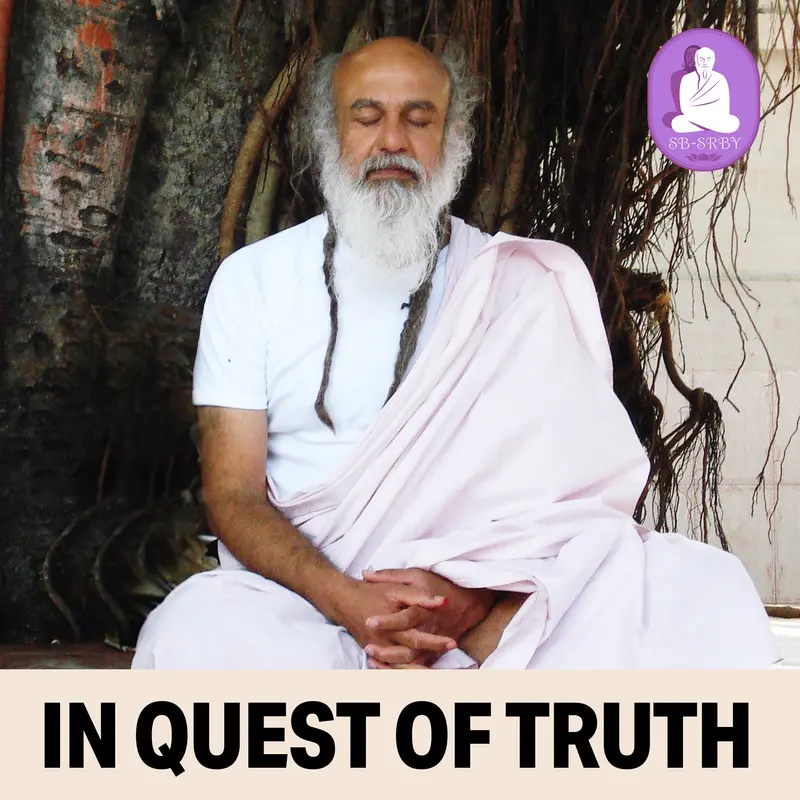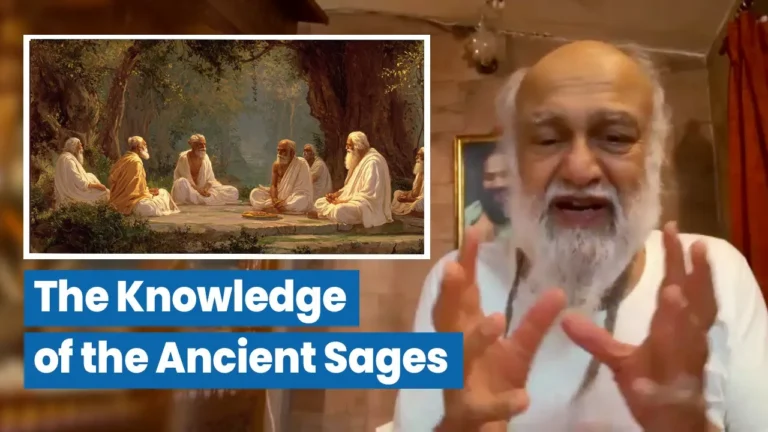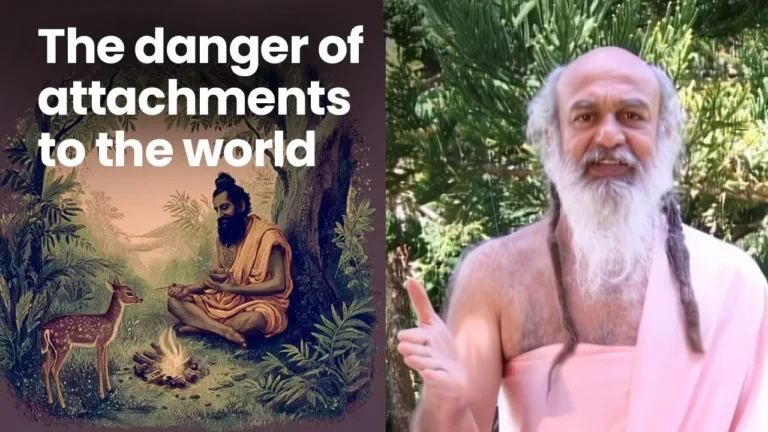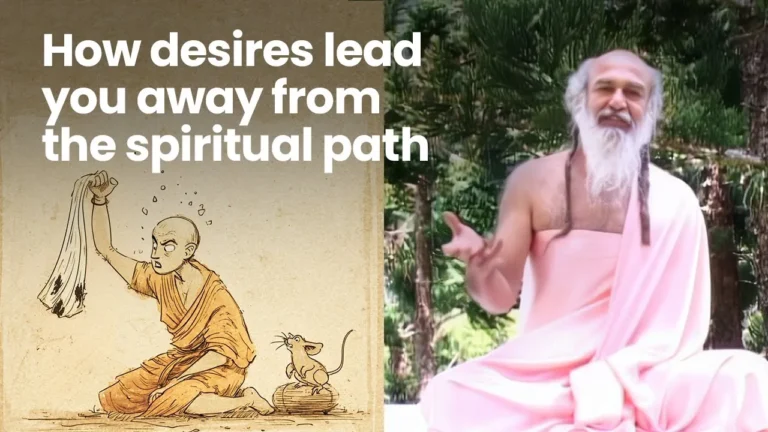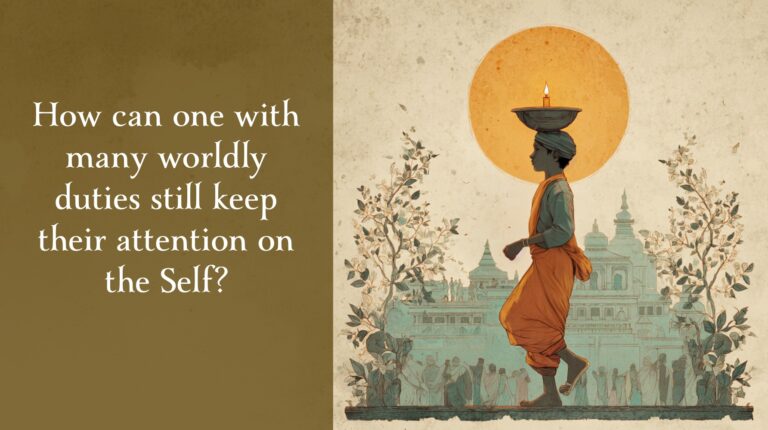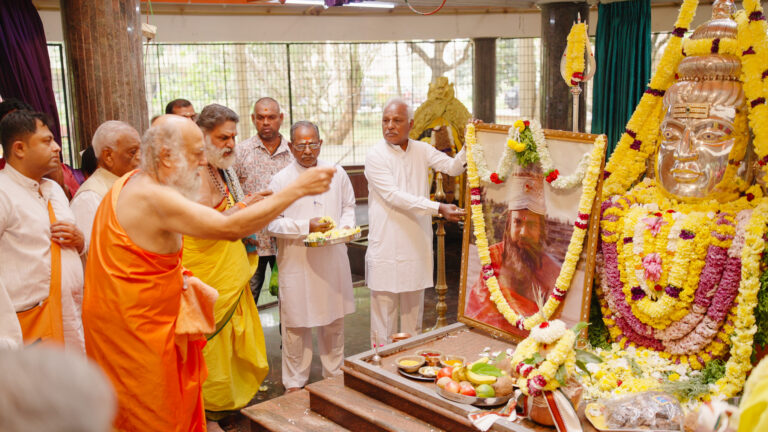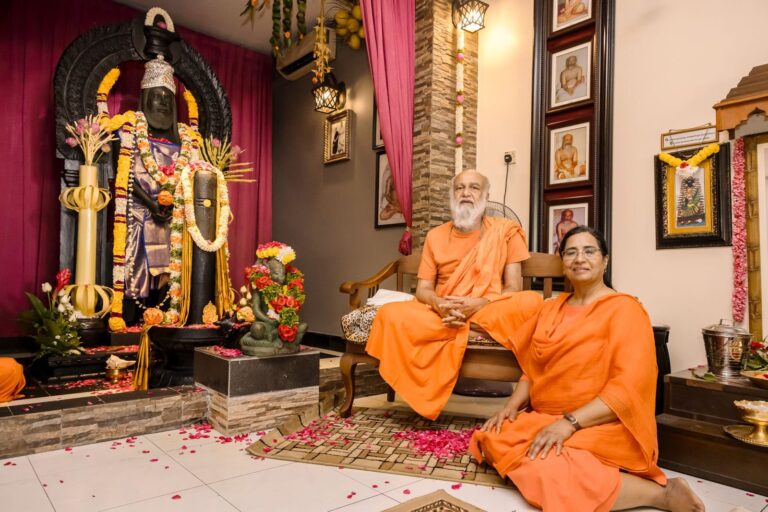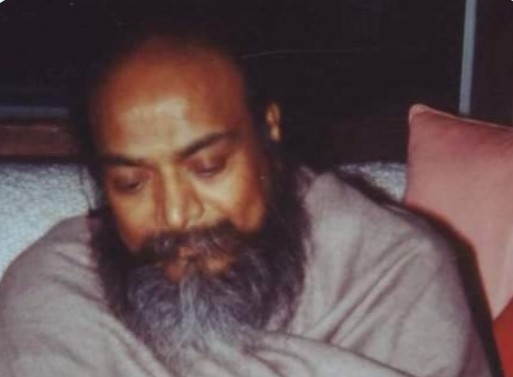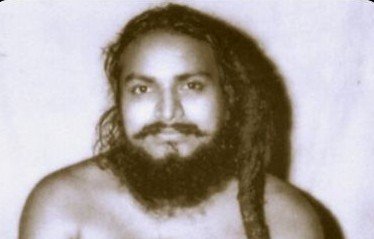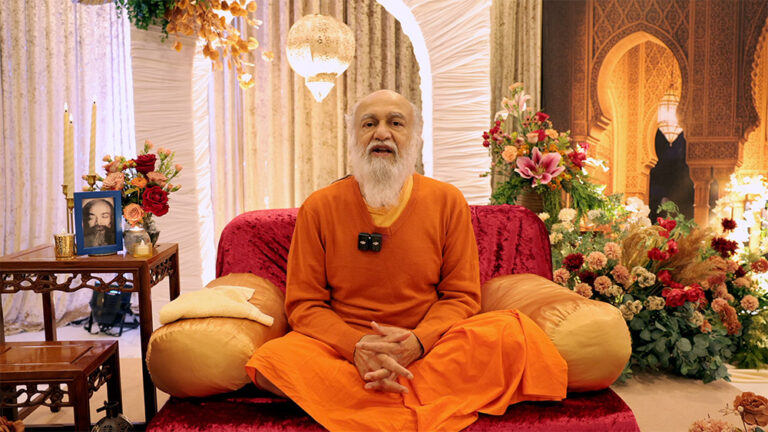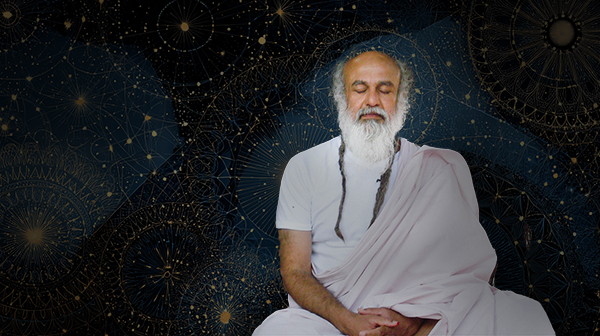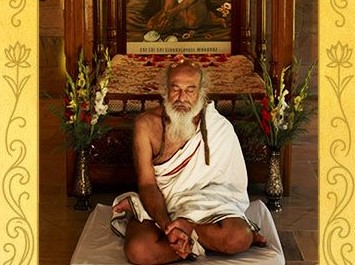Recorded on 03 September 2022 with worldwide participants
0:00 Intro
0:16 What does Babaji mean by the term sadhana?
1:35 The story when Swamiji pulled Babaji up for translating sadhana as meditation
5:45 Outside of meditation are there things we can do to keep the mind quiet as a sadhana?
7:42 Babaji explains how practicing service is not a sign weakness but can be used as a sadhana
14:01 Are some forms of sadhana higher than others, is meditation the highest form of sadhana?
16:05 Is sadhana and moral behaviour in the world related?
21:18 Does a Buddhist puja count as sadhana?
21:58 Did caring for the handicapped boys at the ashram reduce Babaji’s sadhana?
23:39 How would Babaji keep mental calm if he was ill and unable to perform his duties at the Ashram?
31:53 If we perform sadhana and then we stop, do we lose the benefits?
32:49 Could it be said that taking the Darshan of a Yogi is a form of sadhana?
33:59 Could Babaji explain the relationship between acquiring patience and practicing quietness?
35:30 To what extent does our practice help our relatives who have passed on?
41:00 When our body feels uncomfortable to sit for meditation – how to strengthen the mind to keep sitting?
Discourse: Thus Spake Babaji – online Q and A No. 106
Sadhana in Daily Life
Recorded: 03 September 2022 with worldwide participants
Start of Questions and Answers
Question: Tonight, the topic was going to be sadhana in daily life. And we were hoping first if Babaji could just explain what He means by the term sadhana.
Babaji Maharaj: Sadhana is ‘efforts to achieve’ – that is the literal meaning. Here sadya, making it possible; siddhi, achieving something, that you have achieved. So that’s what it is. Here, in spiritual terms, sadhana is your efforts to achieve total silence of the mind and gaining the awareness of your real Self, what you are. So, that is what the sadhana means here. Sadhana is a common word – it can be you want to do sadhana for anything, but here in spirituality, what we mean is your efforts to achieve total mind control, total stillness of the mind, and then eventually Self-awareness, Self-Realization.
Question: Thank You Babaji. Babaji has told a story when He was once with Shri Swamiji in the Ashram and He was translating for Swamiji and translated sadhana as meditation. Could Babaji please just recount that story and its significance, please.
Babaji Maharaj: What I remember is – once Swamiji told me “Tell him to do sadhana.” So, I translated “You have to do meditation.” Then Swamiji pulled me up. When I am telling sadhana, you tell that sadhana.” Because at that time, I couldn’t understand what He meant by sadhana. I just thought that His mission is to meditate, so anybody has to meditate. Then afterwards when the darshan was all over, when I brought Him dinner, at that time He explained, “Hey, sadhana means it can be anything. Means you achieve a siddhi. Siddhi means you achieve something, your efforts. So, why should we just tell you how to do meditation. Let them show interest that they want to meditate. So, then we can teach them meditation. That is afterwards. First they must show they have a spiritual inclination, they are interested in spirituality. So then we have to tell, “Simply sitting is not going to give you anything or you should not expect any spoon-feeding; you have to do sadhana.” That word first we have to tell them. Once they are ready to do sadhana, then we can recommend “You try to do this meditation and see.””
In fact, every time He initiated people, He was such a unique teacher, never tried to impose either His own philosophy or the sadhana that He wanted everybody to do, like meditation. He never tried to impose. Like even after initiating people, He used to make us read, “If you are doing any other type of sadhana, you can continue either before meditation or after meditation – only do not mix it with meditation, that is all. During meditation you just have to be silent. So even if you have been initiated by any other Master, by any other type of sadhana you are doing, no conflict, no problem, but try to do this meditation also. So eventually, if this appeals, if you think it is worthwhile, if you think that you want to pursue, if you think that you want me either as a Guru or a friend, then I’m ready to help you. Then it becomes my duty to guide you, to inspire you.” Like that Swamiji used to tell, He explained to me this sadhana. So that’s when I understood that we should not impose things; a yogi doesn’t try to impose. After that some other time also He even explained, “See it is human nature. You cannot impose on any one about anyone, anybody. So you tell “I want to be your Guru, you adopt me as Guru.” If you are not appealing to that person, he may not like to adopt me as a guru. So that’s it. So what can we do? So we have to leave it, allow that person to his liking, to his wishes.” So like that Swamiji told. “Only if the student is ready to accept me as a Master, then he automatically becomes our disciple. If he doesn’t adopt, he can adopt me as a friend also. In the mitra bhava, as a friend I initiate people into that technique of meditation.” Like that Swamiji explained.
Question: Thank You Babaji. Babaji, during the times of the day when we’re not practicing meditation, are there other things we can do to try and keep the mind quiet as the sadhana?
Babaji Maharaj: Yeah, definitely. In the mind you can try to chant some mantra which is not very difficult to repeat or pronounce, and not long; a shorter one always can be very helpful. You can continue working also and in the mind, slowly you can make the mind practice. And you will always see, after some time, after the practice, mechanically you can go on doing your work physically through the physical body. And the mind gets used to and practices chanting that mantram all the time. Thus the mind gets delinked slowly from the action that you are undertaking through your body. So your mind will not get involved, eventually. That’s what is known as the witness, sakshi bhava, that can happen. That is like a karma yoga; it can happen.
So anything that appeals to you, if you know how to sing, you can keep humming some songs and tunes, or listening into – nowadays a lot of modern gadgets out there, you don’t have to have a big radio like that; a small instrument, you can just stick into the ear, and they go on listening, and they are busy crossing on the highways also; that is dangerous sometimes, very risky things the youngsters do. But however, in home or at work, you would be able to do that one, slowly, wherever you think that your work doesn’t require that much of focus. So then you can practice these things also while you are busy working.
Question: Thank You Babaji. Babaji has sometimes spoken of selfless service as a form of sadhana. In the West, some people consider service to be a sign of weakness. Could Babaji please explain how it’s not a weakness and it can be used as a sadhana, please?
Babaji Maharaj: I understand. Maybe simply the cultural difference. I have also seen in the Western cultures, most of the time, they would like to use the word assistance at the most or helping. Even to the Guru also, disciples considered that they are helping the Master. Whereas in our culture, Master doesn’t need anybody’s help, because it is the world which needs the Master. And so when you are assisting it is a service to the Master so that He can continue His mission. That’s what is recommended in ancient Indian cultures since long time. So service is considered very holy, and very privileged things. To serve a Master is a very privilege, so we are so blessed that the Master allowed us to serve Him. So that’s what we considered always. But finally, it is as equivalent as helping a Master, assisting a Master; simply culturally you can think. But service is also equally simply helping a Master that’s all you assist. You don’t have to become a slave. You don’t have to allow the Master to kill you or to beat you, whip you, all these things; a Master wouldn’t do all such things. Master would give you love, understanding, affection also.
If at all He utters a negative word, that is to train, benefit, or bless; remove the karmas of a disciple. But sometimes in these modern days, a disciple might misunderstand and leave the Master – “O, this Master has spoken very negatively. He is no more a Master. I’m going to leave Him.” And such a person can leave and go away. Even during Swamiji’s time we have seen, for smaller things if Swamiji scolded or told some negative words they have left Swamiji. “O, one day I will never come back to see Him again.” So, that much of anger they have shown.
I used to wonder – what sorts of people are these? For last five years, I have seen this person so attached, always used to show as if he loves Swamiji so much and would talk about Swamiji, be talking to Swamiji, all the time be with Swamiji. Just for one time, one word, one sentence, or one scolding Swamiji gave, they will simply abandon Swamiji, leave, and then scold Swamiji all sorts of nonsense things, “Swamiji is this, Swamiji is that. He is never Self-Realized”, like that. So, they would leave. So that culture is not recommended in Indian ancient cultures.
So the Guru…like Swamiji Himself used to tell to train us also; with us He used to tell about Kabirdasa. Kabira got initiated indirectly because Kabira was a weaver’s person belonging to some other religion, not of the religion that His Guru belonged to. So His Guru refused to initiate Him into the sadhana. So then what Kabira did? The Guru everyday used to go for a Ganga snan, means a bath in the holy river Ganga. So, on the steps He laid down. So, it was early morning, still darkness, the Master didn’t see Him. So He stepped on Him. And then he utters the name of Rama. “O Rama, Rama, what is this? What did I do? I did something wrong.” So, Kabira takes it as an initiation, that name of the Lord Rama and starts repeating that one. And eventually He became Self-Realized, such a noble devotional person. Well, some people when asked about Kabira, to the Guru “Your disciple has become quite famous and he always praises You. He says that You are His Guru.” Then the Guru ridicules, rebukes Kabira. “I am not His guru at all. He has no right to consider me a guru, He is an untouchable person, He did the wrong thing of taking my initiation; that is not the way. The Guru has to give willingly.” And then those people come and tell Kabira. The Guru uses very negative word also, apart from this, Swamiji used to tell that one. Then those people come and tell Kabira “Look, You are considering that person as Your Guru, and You love Him so much. And You do sadhana in His name and repeat that mantra that he uttered as Rama. But He keeps scolding you, He uses such wrong words or inappropriate words about You.” Kabira says, “Hey, He is a Guru. He’s like my mother and father. If He uses some word it maybe to remove my karmas. That’s why He’s doing that one. He is so kind, to use such a negative word about me. I’m really grateful to Him.” That’s what Kabira says. Like this, Swamiji used to tell. He tells, “It’s no problem”, He said. “That is how one disciple has to be if he’s really interested in Self-Realization; if such a disciple is really interested in liberation, must not nurture ego anytime, any moment, under any circumstances, in any situation.” That’s what Swamiji used to tell.
So that’s the beautiful culture of karma yoga also, and the Guru-disciple relationships. So all these things that’s always told. Is this the question all? Have I answered your question? I keep forgetting what the question was, when I got carried away with my answer. [laughs]
Question: Very beautiful Babaji, thank You, thank You. Baba, are some forms of sadhana higher than others? Is meditation the highest form of sadhana?
Babaji Maharaj: in my opinion, and what I heard from Swamiji, meditation is the highest form of sadhana because in which you are directly trying to make the mind quiet on its own without the help of any external anchor. Like you’re not trying to take the help of any mantra or any chant or any breathing or concentrating on any form or formlessness, nothing. You just watch in between eyebrows. Just watch and eventually when you lose all the thoughts, the attention turns to itself. So, this is the highest form of sadhana where you are not taking help, you are not stuck anywhere else, you don’t have to abandon anything – directly it will take you to the Self without you having to imagine or know anything about the Self. You will directly become one with the Self, merge with the Self.
So the rest of all sadhanas are like a preliminary round practice of exercise where you first try to do the practice to make this mind single-pointed; at least instead of having a million thoughts, it is stuck into one thought. Then you have to abandon that thought with the help of the Guru or by God’s grace, then you abandon that, then you merge with the Self and become one. Just like Ramakrishna gave up the Kali name and went into nirvikalpa samadhi and became one with the Self.
Question: Thank You. Babaji, are sadhana and then also moral behavior in the world, are they related in any way or are they quite separate things?
Babaji Maharaj: It is related. Means, here in spirituality, if you are doing the sadhana for mind control or stilling the mind, silencing the mind, it is also to purify the mind. When the mind becomes silent it becomes purified. But it doesn’t lose its ability to think or imagine or be creative. So that is important. When once the mind is purified of all its earlier, previous acquired habits, all patterns, attitudes, everything is erased and dissolves – manolaya what it is known as – then when it becomes totally silent and gains the Self-awareness, becomes Self-Realized, then when that mind thinks, it will always be in a purified way. And it will not be negative about anybody, about anything in any way. Like Swamiji used to tell, “Even if I use a negative word, even if I slap you, I’ll be doing a benefit to that person only, I will be doing a favor to that person, all karmas will be removed. If I laugh at a person, I can give the whole world. If I scold and become angry at a person, I can liberate him.” So that is the essence of a yogi, because His consciousness is the purest one. When He thinks, He thinks of the welfare, that is the upholding of moral values, consideration to each other. Even if somebody hurts, I feel very compassionate to the person, “O God, he has hurt me. I don’t want him to acquire any karma,” we start thinking. So somehow if I get a chance to scold him, that karma can be removed; if I keep quiet, if I pamper that, he will have to come back again and again in this world and undergo such karmas. So wherever possible we try to remove such people’s karmas if they have been dearer to us. See, if certain person served me for a long time, suddenly he had to go, he went away, or while going if he had behaved a little bit wrong, so that person might be acquiring a karma. So we feel compassionate, “O God, all these years, that person served me so well, so attentively, so lovingly, like a child of mine. So somewhere I need to pull him up, somewhere I must use some word or something so that that karma can be removed.” That’s how a yogi becomes so compassionate. He can never think bad or do bad to anybody.
That means upholding the moral values. That’s how it comes. And when a yogi thinks He thinks of a larger cause, welfare of all the worlds, all beings everywhere in every way. There is no such a reservation that “This person has misbehaved with me, I’m not going to bless him. This person has behaved very well, I’m going to bless him.” There is no such discrimination. My blessings will go to each and every one. Vibrations are going. If only they can have faith, they can receive it very quickly, they become receptive. So that is the idea. So, any purified consciousness, any person, if he is really even meditating, even if he has not done tapas also – suppose he is doing meditation for long years, such a person’s consciousness would have become purified and his behavior will be better, consideration to others; he won’t try to rob others’ property, he won’t try to usurp others’ land. So he won’t try to do anything for his selfis needs. That person would have lost selfishness and narrow-mindedness, would be able to think of a larger cause always – that’s what is upholding the moral values, consideration to each other.
So these both are connected, because ultimately it is the mind, by its imagination, which induces you into a certain action. So if the mind is acting in a purified way, if it can think of a larger cause, that we all belong to one space. From a small home, remember my example? From a small home in the street, and in the town, in the city, in the state, in the country and on the planet earth, and now you belong to one space; we all belong to one space, beyond which nobody can go – we all have to exist in the space. So that is the final understanding that we all are one; there is that oneness there. A yogi will see the Self, and we have to pray for our own welfare when we pray for the welfare of all beings in all the worlds, be happy.
Question: Thank You, Babaji. Babaji, we’ve had a question sent in by Paul, if I could ask that please? He said, “I perform a Buddhist puja twice a day. Does that count as sadhana?”
Babaji Maharaj: Provided you apply your mind. Everything can be a sadhana. It is the mind which is important. You can do any form of puja that appeals to you, that you have an inclination, you are most welcome. Only take care that your mind is also there. So then that is sadhana.
Question: Thank You Babaji. While Babaji was in the Ashram serving Swamiji, Swamiji sent two boys who were handicapped to be kept under Babaji’s care, and the care of the second boy was more difficult even than the first. It must have reduced Babaji’s chances to perform dhyana. Did Babaji feel that that reduced His sadhana in that situation?
Babaji Maharaj: Yes, because Swamiji had to ask me to do, I didn’t feel anything negative, anything wrong with that. And always while doing seva looking after that boy, service, I used to think in the mind, “May this service reach the Lotus Feet of my Master. So may He bless me for liberation so that I’m not reborn again. I must not see any drishya, any scene at all.” So that’s what I used to pray. And mind used to feel very peaceful, very refreshing, withdrawn and quiet. Quietly used to go. “I don’t need anybody’s certificate. No need for any fruits for this service. It must reach only Swamiji’s Feet, my Guru’s Feet. I need to receive blessings for liberation, for the highest. I need Swamiji.” Like that I used to keep thinking in the mind. So that gave a lot of satisfaction. And mind receded, of course. It never went into any agitation; “Why I should be doing like this, why Swamiji has given me this hard work?” Like that not even once I thought any time.
Question: Thank You, Baba. Babaji following on from that question, Suchetana has sent in a question also. Does Babaji remember ever falling ill while doing sadhana in the Ashram, especially when looking after the boys who were mentally challenged? And how did He manage the huge responsibility as well as mentally calm in that situation if He was ill, so that He wasn’t able to perform His duties the way He normally would be able to? What is His advice to us to do sadhana without being negligent in duties in the world, please?
Babaji Maharaj: Probably one thing. My attention was on Swamiji always, as I had fallen in love with Him. If He had asked me to do anything, any other odd, any dangerous thing, anything, probably I would have done it without questioning, without thinking twice in the mind, I would have done it. That was the love I had developed. Whatever Swamiji asks me to do, it is for my liberation. That conviction was there for me. “So if I just do this without questioning without bothering in the mind, I will be liberated, Swamiji will bless it.” I used to assure myself positively like this. “Swamiji will take care of it. He will take care of my liberation. I don’t have to bother. This is easier just to look after this boy.” Like that. Apart from that, the first time that Swamiji came in 1978, so before He sent that first mentally challenged boy from Mysore, so He asked my willingness. That was the uniqueness of Swamiji. He never ordered or imposed any such thing. He asked my willingness and told “You see, if you are willing to look after that boy because he’s very violent at home. But here I will bless, he will be alright with you. Don’t worry.” Like that, Swamiji said. “Look, I will tell a story also.” That’s how He told the story of Saint Veerabrahmayya and his disciple, but He didn’t tell the name of Veerabrahmayya; He told in a different way.
In ancient times there was a Guru. So, he had some disciples. So the Gurus used to walk, go on walking long distances. So, one day Guru wanted to test all the disciples. He went on walking long distance. For two, three days, he went down like that, and he did not stop. Usually, they used to stop in the evenings on the outskirts of a village, then the students, disciples used to go to the village, bring some food, beg alms and bring food. First, feed the Guru, and then they all used to partake the prasadam. That’s how Swamiji said. But here for three, four days continuously the Master was going on. And the disciples wouldn’t dare tell the Master that “We are hungry, we need to have some food.” They quietly followed, but they were murmuring, “O God, we are so hungry, what to do? I hope our Guru will realize that we are really hungry.” Then the Guru suddenly stopped and looked at them. He showed a dead dog whose body had become very decayed and foul smell was coming out. So then he told, “O poor children, you all must be feeling very hungry. Now you come, look at this dog. You all eat this meat, you all eat.” Then other students, they went back, “O, this is emanating foul smell and this is decayed. The Guru is just testing whether we will eat this foul smelled decayed meat also or not.” So they kept quiet. “Now we must use our intelligence. That’s what the Guru wants to test; we must not be eating this.” But one disciple who was totally dedicated and had such faith, he was always in the bhava of Guru, Swamiji said. So he simply went and put his hand to eat the meat. And as he went on eating, it all got converted into beautiful sweets. And he went on. He ate and he filled up. Then Guru blessed him. Then all other disciples became jealous, “O God, we did a mistake of using our brains and not eating the meat that the Guru said. If we had eaten also, it would have got converted into ladoos, or some sweets. Then Guru thought, “These people are thinking if they had simply listened what I said without having faith, so that wouldn’t have converted for them as sweets; because this disciple had that faith in me, so that automatically got converted as sweets, we must show them this.”
So after some distance two, three days later the Guru reaches the outskirts of another village. He tells, “Now you see, there is a brahmarakshasa.” Brahmarakshasa means in ancient Indian stories, legendary story it is said that when a person kills a brahmin who is doing sadhana for the Divine, so such a person becomes the ghost in the form of brahmarakshasa. So that’s what it is known as. “It is on the tree. I’m supposed to give it salvation, supposed to liberate that. So, if any one of you can go and catch hold of that, bring it to me.” When other disciples, they thought “Now we must listen to the Guru. Because the Guru has ordered us to go and bring that, we must not question. Let us go and bring.” One by one they went. But that ghost drove them away by beating them up. They all came and said, “Guru, we listened to your order yet we could not succeed. So it is very wrong of you. You should not have done like that. You did not give us any power.” The Guru said “The power is not in me. It is in your faith. You did not have any faith. You just went and you got beaten up. Now look at it.” So, he calls that disciple. “Would you like to go on bring this one?” He tells, “No problem. If you want me, I will do that.” With folded hands, he surrenders. Then he asks a question also. “Master, you have ordered me to bring a ghost. This time it’s not eating meat. It’s a different task. Please give me some technical point how to bring that ghost? How will it surrender to me? How can I bring? What is the trick?” Then the Master tells, “Look, quietly go, keep talking sweetly, then catch hold of its hair and then it will surrender to you. You bring that to me.” So then he goes, and he brings like that catching hold of the thing. And then the Guru liberates that ghost also, then he scolds others, “You see, simply not listening, you need to have faith. That faith only can work wonders for you.”
Like Swamiji then He told me also, “Look, if you have faith, if you tell that you will look after the boy, mentally challenged boy, then I will ask his family people to send him here, and he will not be violent with you. He will listen to you.” On his own Swamiji told, “I will tell you the trick also, you see; just keep a cane. You don’t have to beat him, but threaten, if that boy is not going to listen to you, tell him “Until now I had not beaten you, but today I am definitely going to beat you.” And he will listen to you.” So slowly I learned the trick by Swamiji’s Grace also. He became very fond of me. And I didn’t have to show him a cane, also. I used to simply drag him towards the gate. Tell him “You go back. Go back to Mysore. You are not a good boy. I won’t keep you here.” Then he used to come back. “No, no, no, I will stay with you. I will stay with you; I will stay with you.” Like that Swamiji has blessed and everything went well.
Question: Thank You Babaji. Babaji, if we perform sadhana, and then we stop, do we lose its benefits? Or do the benefits stay on for some time?
Babaji Maharaj: It will stop. Whatever sadhana you have done, only that much of benefit will be there. But the risk that the mind will fall back to the world and go into a lust and greed is always there if you stop the sadhana. So, because if you mingle in the world, and if you look at the world, the mind can get attracted to the world, it can get into an egoism and arrogance, all these things can come and lust and greed, all can come. You might go away from the Guru in your consciousness because of your own ego. You will be the loser. Such a thing can happen. So sadhana must not be stopped until you reach the goal.
Question: Babaji, could it be said that taking the darshan of a yogi is a form of sadhana, or is it simply grace?
Babaji Maharaj: Definitely it can happen, provided the person who comes for darshan has the devotion and the faith and attachment to the Master; then that will be benefited. Simply people coming in front of a yogi will not benefit them. But it may take long time; it will benefit to some extent, but it will take long time. Suppose, in front of Swamiji out of curiosity, millions of people came. Not everybody did become his disciple or go to sadhana; they all went back. Somewhere, after 55,000 life cycles, they might be benefited. But it’s like the distance goes longer. If you have faith, that one darshan can give you such liberation. That’s why Swamiji used to tell, “Giving darshan to people is my services to the humanity,” He used to tell. “For loka kalyanam.” He used to talk that word.
Question: Thank You, Babaji. We have one question that’s been sent in by Casey. Could Babaji please discuss the relationship between acquiring patience and practicing quietness, please?
Babaji Maharaj: Practicing of quietness is recommended so that slowly you can become quiet in the mind – that you must take care. Becoming quietness means not talking through the mouth. But simply you don’t talk through the mouth, but you give rise to violent thoughts in the mind – that you have to take care. So you need to keep the mind engaged positively. Or practice the mind also to become quiet as you remain quiet. That is very important. Otherwise, for a person who is observing total silence, he might get irritated, annoyed if a certain thing he wants, and the other person is not doing. That person can get irritated, can start beating up; we have seen these things. So instead of that it is better to talk. So, what Swamiji used to say “Talk a little wherever it is necessary. Talk little, don’t become a chatterbox or don’t become a dumb person also, either way. If at all you want to be in silence for some time, take care that your mind also is silent, then it will be beneficial.”
Question: Thank You Swamiji. It’s always a great joy of my week to be in these satsangs. I have a question about sadhana. It’s a little bit complicated, I suppose. And that is that there’s been a lot of emphasis in many of Your talks lately on Your own discipleship with Your Guruji and on Your parents and His parents. And part of sadhana, seva, suppose, is towards one’s family, towards one’s parents. Now, if one’s parents are dead and long gone, and in some other world or even reborn someplace, practicing our own kind of devotions towards our ancestors is like abdika shraddha, yearly rituals, that kind of thing. It’s a good practice for us for self-cultivation, but to what extent really does our practice actually help them?
Babaji Maharaj: In a real sense only, a prayer to the Divinity. Because every soul is connected to the Divine, that is the ultimate oneness, that truth is. So, if you pray to the Divine to guide and bless the souls to go back to the Divinity as soon as possible, getting liberated – that is the highest form of prayers that you can pray to God. In any other way it will be very difficult, very impossible, because the departed souls would not be remembering their relationship to you when they were in their physical bodies; all such things would have gone. So, only this is the one way. And doing the shraddha also is actually you have to remember the Divinity to bless them to get liberated, and you pay tributes in your actions, and you try to remember their best qualities through which you could learn some good thing in life. So that is the idea. Like if at all, we have installed our parents idols also in our native village Ashram, it is only for this purpose, to pay tributes, and to pray to the Divine to give them liberation, to bless them. If at all they have to be born, to bless them to have the inclination towards spirituality we pray to God. So that is the best thing you can do.
Question: So it’s not exactly that it communicates with them. But it’s good for us to bring their spirit, their jiva into our own life?
Babaji Maharaj: Yes, we can remember their good qualities, like we always would like to remember whatever our mother or father taught us about devotion, about focus, any such thing. And the Guru – our Guru also has dropped the physical body, the way that He taught like a mother and father, you’d like to remember; we would like to pay tributes. But here for the Guru, we don’t have to pray to God to give liberation; He was already liberated. So we just would like to receive the Guru’s blessings further so that we also remain Self-Realized; and then achieve that final merger when the body is dropped. Like that we remember. With the parents, we try to remember – they were noble, they were pious; we remembered all the good deeds. Whoever came to home, they used to feed, mother used to feed. Such good qualities, remember, and finally we pray to the Divine to bless them to get liberated as soon as possible.
Question: So this should be a part of our sadhana to actually make these kinds of appeals and prayers and so on?
Babaji Maharaj: It’s recommended. So that is a good thing, because in this world, from whomever we have received some good thing, so we need to be grateful to them. We pay tributes to them. Like if it’s from parents, from Gurus, from anywhere we got a chance to learn, they become equivalent to a Guru, so thus we do pay tributes; that is necessary. So, it is always… departed, because there is another example I use. My father that told, “You see why you have to remember the dead people because when they died, they could not lift their own body and put it on the funeral pyre. Four other people lift it and put it on the funeral pyre. In the same way when you die, your body also, you won’t be able to handle anymore once it is dead. So that’s why you pay tributes to them, pray for them, so that your body will be looked after in a honorable way when it is dropped.” Like that my father had told I remember. So that’s when we pay tribute to the other, when we are helpless somebody else will have to help us, so that’s where we have to be in that paying tribute, shraddanjali – that’s what it is.
Same Questioner: Seva bhava?
Babaji Maharaj: Yeah, that’s exactly the seva bhava.
Question: Pranam Babaji. Babaji, thank You for Sant Kabir story and shraddha, shraddanjali. Babaji, my question is – often when we sit for meditation, our body reminds us of the aches and the pains. And it makes us uncomfortable to sit for meditation. And I try my best to do sadhana. But why doesn’t the mind remind us about meditation? Is it because I’m doing meditation the first time this life?
Babaji Maharaj: Ah, you see, what you lack would be the toughness, determination. Hang on to it. Like you all know the old saying, “When things get tough, only that tough get going.” Remember that determination, then you can do that one. When it becomes a struggle, if you face the challenge, instead of struggle you will be facing a challenge actually; you don’t have to struggle. You are courageous and you will do it. Means, whatever is possible, keep trying to do it without abandoning; don’t give up until you don’t die. Don’t give up. Keep trying! Keep trying!
End of Session

